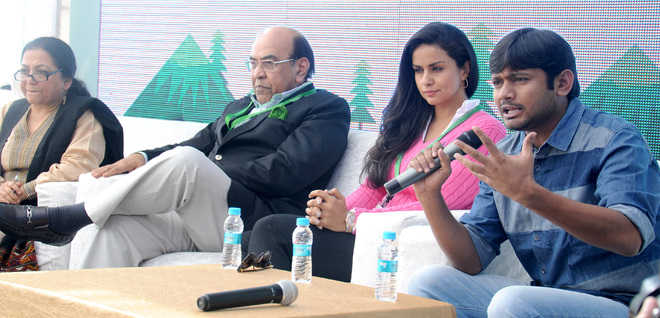Sarika Sharma
Tribune News Service
Kasauli, October 15
Kasauli clapped and it clapped for various ideas of nationalism, the most volatile subject today. With Kanhaiya Kumar, former president of the Jawaharlal Nehru University Students’ Union, on the panel, this session was certain to be the most interesting on day two of the Khushwant Singh Literary Festival.
As the first speaker, the student leader questioned the idea of nationalism. He said nationalism is culture-based but the State sees it in a legal framework. He said an identity that sparks hatred can’t be a national identity.
Kanhaiya, who faced charges of sedition earlier this year, said, “Tagore says the idea of nationalism is flawed in itself, it becomes a burden. Had Tagore been alive today, he too would have been labelled anti-national.” “A Bihari Hindu may eat rice and dal, but can’t tell a Kerala Hindu to not eat beef,” he said. “What I eat and what I don’t eat, the State can’t decide. That right I have been ensured by the Constitution,” he insisted, to a thunderous applause. He pointed out that while we claim to be secular, we deny Muslim actor Nawazuddin Siddiqui a role in Ramlila. “That means we are not against Pakistan, but a certain religion.”
“Ultra-nationalism is a threat,” he said and “hope lay only in upholding the Constitution”.
Next up was actress Gul Panag. She said she was a nationalist, “loved her country”, but wasn’t blind to her country’s faults.
Defence expert Lt Gen Syed Ata Hasnain (retd), waiting to train his guns on Kanhaiya, said that the student leader didn’t know that he, a Muslim, would head Diwali puja at the Army cantonment. Taking a dig at Kanhaiya, he said even though many members of his family were in the Army, they didn’t seem to know the Army’s traditions.
Refusing to comment on whatever was said by her fellow panellist, an apparent reference to Kanhaiya, writer Madhu Kishwar said nationalism was a nasty idea and spread blood wherever it went. She said nationalism wasn’t about saying ‘Jai Hind’ or wrapping yourself in the national flag or jingoism, but something that at the mohalla level and spreads across the country.
Earlier in the day, Montek Singh Ahluwalia, former Planning Commission deputy chairman, spoke on 25 years of liberalisation. Recalling those times, he said it was a tough call to take when all the other parties were opposed to the idea. “People had profound views. The Left opposed it as it was convinced that the government must allocate all resources. The right-wing was in favour of the Indian private sector,” he said, adding that it took a lot to sell their ideas. The day began on a heady note with a discussion on Shiv Kunal Verma’s ‘1962: A War that Wasn’t’ and Venkat Dhulipala’s ‘Creating a New Medina: An idea of Pakistan’, which was moderated by former Union minister Salman Khurshid.
A session on ‘Lost Heritage: The Sikh Legacy in Pakistan’ also drew immense interest. Author Amardeep Singh, in a session moderated by author Roopinder Singh, shared how the Sikh structures in Pakistan are fading away without anyone having an idea of what they are losing out on.
Unlock Exclusive Insights with The Tribune Premium
Take your experience further with Premium access.
Thought-provoking Opinions, Expert Analysis, In-depth Insights and other Member Only Benefits
Already a Member? Sign In Now










